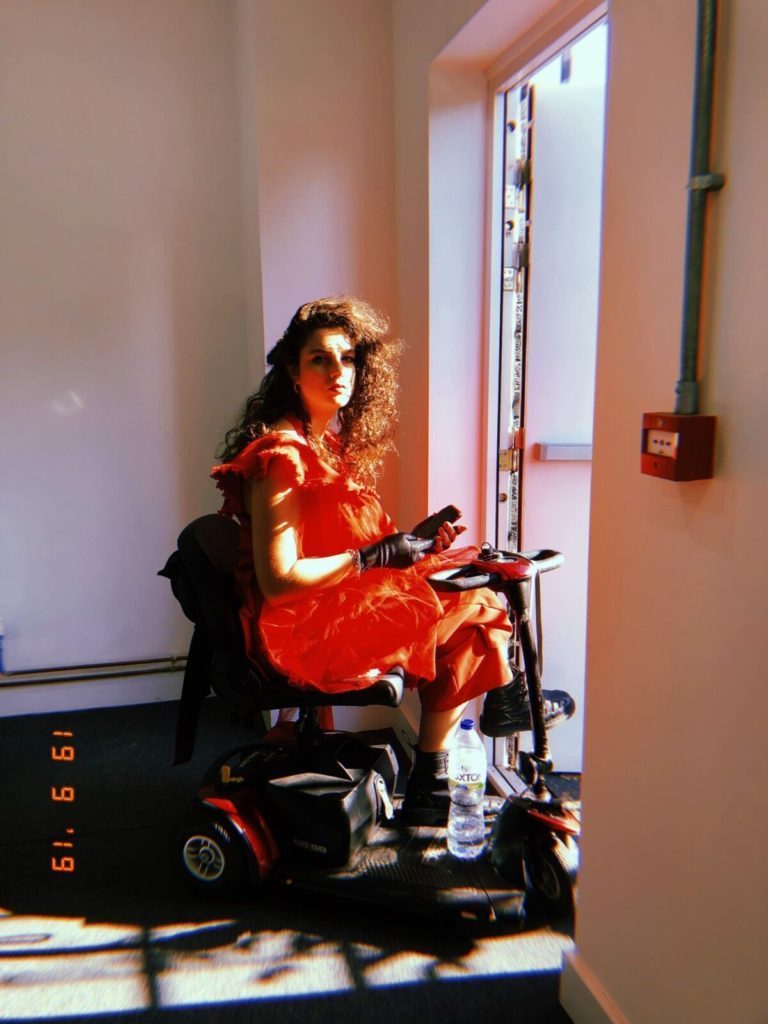The impact of coronavirus on musicians worldwide is significant, as featured recently in American Blues Scene. Ruth Patterson, founding member and lead singer/multi-instrumentalist of Holy Moly & The Crackers, gives insights into the challenges faced when the touring stops. Ruth takes immunosuppressant drugs for her arthritis and following medical advice will be in self-isolation for the next 12 weeks. A fortnight ago, as the band raced home after their European Tour was suddenly canceled, she wrote the following about how, as many people stare down the barrel of similar quarantine measures, lessons can be learned from the disabled community.

As a disabled touring artist, me and my bandmates’ careers have had our fair share of disasters but the new coronavirus pandemic has taken it to a whole new level. Like many bands, it has destroyed our immediate future and there is an increasing uncertainty in what lies ahead. Last week our 6-week European tour was dramatically cut short only 2 weeks in. As the borders suddenly began shutting, we faced a 20-hour van race back home to Newcastle-Upon-Tyne, avoiding as much contact with people as physically possible. It is tragic for us, but as I scroll social media for updates and see how many others face the same gloomy predicament, it occurs to me how irrationally stable I feel about the situation. Yes – I hate to be out of work, to disappoint our fans and to have a tour, that took months of planning, grind to a halt (and let’s not even get started on the grim financial implications). But I don’t feel quite the same panic as everyone else. And it’s something that I see across the disabled community: we are just quietly carrying on as normal.
As the rest of the world goes into crisis about how they’ll cope with cancelling social occasions, working from home, living frugally for a while as they self-isolate themselves, the disabled community is perhaps more resilient. We suffer set-backs and disappointment in our lives often on a daily basis, with a wide array of challenges: having to take time off work; unexpectedly having to muster up money for new mobility aids with no other option available; often living on very low income and somehow having to make it all work. Living with a chronic illness and disabilities means we have to constantly adapt and learn to be positive and productive in the face of chaos. We just carry on. It is business as usual for us.
I was diagnosed with severe arthritis when I was 15 and then with Ehlers-Danlos Syndrome (EDS) at 21, and I have been a wheelchair user since. I take immunosuppressant injections, which have led to a number of serious illnesses due to my compromised immune system. Let me be clear, this is not a pity party. I don’t feel sad about any of this. If anything, these experiences have given me super powers. Like anyone on immune suppressants with chronic illnesses/disabilities, we know how to take care of ourselves better than most. But we also know how to empathise and support others in our community. We survive months of bed rest and hospitalisations whilst managing to keep our heads above water. We got this. If anything, non-disabled buddies who are really feeling the uncertainty, stress and anxiety might now need our help and skills on how to cope.
In the current climate us immune-suppressed warriors, along with older people, are significantly more at risk and it’s something which all people need to recognise. Look out for your chronically ill/disabled family, friends and acquaintances. Listen carefully when we ask for help and make sure you’re aware of what not to do if you’re visiting someone with a compromised immune system. But don’t pity, don’t patronise, don’t ostracise us. We’re probably the most resilient people you know right now and we can teach you a thing or two on how to weather this storm. We’re all in this together so let’s be kind and build some bridges to last into the future.

From a career perspective, to make matters worse, Ruth had been appointed Artist In Residence at the prestigious Sage Gateshead concert venue, using her residency to work on a solo project around her experiences as a disabled frontwoman. This was due to culminate in the writing and production of a debut album and first solo performance at Sage Gateshead in June, the latter now postponed. Not to be deterred by either isolation or disappointment, Patterson is moving forward with her usual tenacity and creativity, starting with a live solo performance from her living room.
This session, Live From the Living Room, was streamed live to a venue in Italy on 21st March via Facebook from the home of Ruth Patterson in Newcastle upon Tyne, England. It was viewed by an estimated 7000 people worldwide — one of the biggest audiences to watch a debut solo performance.
Ruth started by engaging with the virtual audience and expressing her empathy with the Italian contingent over the devastating impact of COVID-19 in that country. Sitting at her upright piano, the confident songstress launched bravely into one of the most renowned tracks of the 1960s, Bob Dylan’s “Ballad Of A Thin Man” from Highway 66 Revisited.
Patterson proves to be a brilliant storyteller through her expressive, conversational-style vocal delivery as she adds drama and suspense to Dylan’s lyrics. It takes a consummate performer to select an iconic song from a legend’s back catalogue, and to nail it perfectly which is exactly what happens tonight. Ruth makes it clear that she is still very much part of Holy Moly & The Crackers, and the slow ballad version of “All I Got Is You” from the band’s recent Take A Bite album confirms this intention. Sung solo with gorgeous piano accompaniment, the lyrics seem to take on a new, more personal and emotional meaning that captivates the listener. It was Salem which propelled the band to international fame, the cinematic soundtrack “Cold Comfort Lane” having garnered 1.5 million hits on one music-streaming platform alone.
The title track of the album might have a dark theme relating to Salem witch trials, but everything else about it is uplifting. Patterson’s extraordinary vocal range, from the mellifluous to piercing tones complemented by the subtle rhythm changes on the keys, contribute to an upbeat finale. There is a poignancy about including “Hospital Beds” by Cold War Kids given the mass hospital misery caused by the rapid spread of the coronavirus pandemic. However, Ruth always manages to communicate hope and positivity when confronted with tragedy, emphasizing the shared friendship and joy of the song as well as the sadness.
The eagerly anticipated follow-up single premiered in the living room; “Somebody Else” is a heart-wrenching reflection on love and betrayal. Ruth always seems to be in control while baring her soul with amazing courage, conviction and just a hint of vulnerability. This vibe shines throughout a song that encapsulates emotions so deep they become embedded in the listener’s soul. Ruth’s debut single, ‘”I’d Give It All,” is a beautifully crafted love song which starts with attitude rather than sentimentality, the emphatic piano chords a precursor to what she doesn’t want.
Not for her “the dozen red rose roses laid at my front door” or the fine wine and dining which “sticks in my throat.” And when it comes to diamonds, “well it might as well be coal.” The strong poetic lyricism of this song is emphasized in the next observation: “And though I know it’s all to please me but the perfume stings / My eyes are not adjusting to the bright lights.” The jazz-inflected vocals set the scene perfectly for the killer line, “You’ve missed the point babe / love is always silent.” While lacking the stringed instruments on the single, there is an innate elegance to this stripped back performance. Patterson’s lyrics soar above the piano chords as her quest to discover the right kind of love, keeping it and never letting go reaches its climax.
The session ends with the appearance of Ruth’s husband Conrad Bird for a duet: the aptly named “I Will See You Again,” their intense chemistry evident for all to see and hear.
For 45 glorious minutes, collective worries have been forgotten and our weary spirits and heavy hearts lifted. Ruth says her farewell, shares her experience of the loneliness of a long quarantine, reminds us to wash our hands, to do whatever we are asked to in order to save lives, and to stop buying toilet rolls! The screen goes blank and we move forward with a renewed sense of determination to overcome this awful disease.

